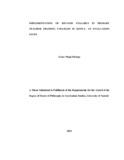| dc.description.abstract | The purpose of this study was to evaluate the implementation of Human
Immune Deficiency Virus/Acquired Immunodeficiency Syndrome
(HIV/AIDS) syllabus in Primary Teacher Training Colleges (PTTCs) in
Kenya. The main variables of the HIV/AIDS syllabus which were evaluated
consisted of the capacity of teacher trainers, teaching methodologies,
assessment methods, teaching/learning materials, students‟ knowledge and
attitude, challenges encountered in the implementation of the syllabus and the
adequacy of the syllabus. The study adopted an evaluation design. The target
population for the study was 1500 teacher trainers and 21,839 student
teachers. The sample size comprised of the 306 teacher trainers and 775
student teachers who were selected through simple random sampling and
multistage stratified sampling method from seventeen (17) PTTCs. The
research instruments used were questionnaires and observation schedule. Data
was analysed using frequencies and percentages. Findings indicate that teacher
trainers were academically qualified to teach the syllabus. About 64.2% of the
teacher trainers were graduates with bachelor of education degree and 19.4%
had master‟s degree in education. Further, 59.3% of the teacher trainers had
attended an in-service seminar/workshop on teaching the syllabus. About
73.0% of the teacher trainers had positive attitudes towards teaching
HIV/AIDS syllabus. Teaching methodologies commonly used were
discussions (91.6%), question and answer (87.2%) and lecture method
(86.6%). Student teachers knowledge about HIV transmission was found high.
Overall the student teachers attitude towards the value of HIV/AIDS syllabus
was positive. The most commonly used teaching materials /learning resources
were Kenya Institute of Curriculum Development (KICD) syllabus (96.0%),
KICD Publications (93.6%), textbooks (98.8%), use of resource persons
(71.0%) and charts and posters (70.0%) respectively. On adequacy of the
syllabus (59.7%) of the teacher trainers felt that the syllabus content was
inadequate. From the findings of this study it is apparent that the syllabus was
worthy implementing in PTTCs since teacher trainers and student teachers had
positive attitudes and appeared to be enjoying teaching and implementing the
syllabus. Although HIV/AIDS syllabus is being implemented through other
subjects it has been effectively implemented. The study concluded that teacher
trainers were well equipped with requisite knowledge to teach HIV/AIDS
syllabus, teacher trainers and student teachers had positive attitudes towards
HIV/AIDS syllabus implementation. The study recommended that in-service
and orientation on professional practices, through guidance and supervision by
the Ministry of Education Science & Technology (MOES&T) be carried out
on teacher trainers. That participatory method of teaching which include role
play, dramatization, visits and discussions should be used more in the
teaching/implementation of HIV/AIDS syllabus in PTTCs. | en_US |

